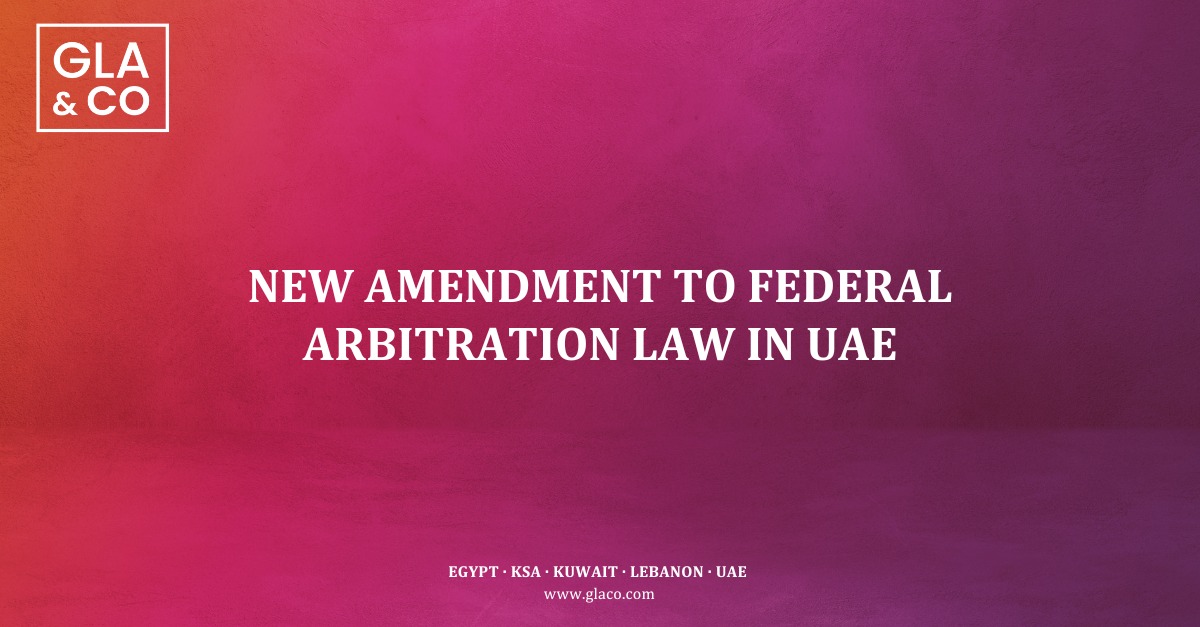
New Amendment to Federal Arbitration Law in UAE
With recent developments in arbitration regimes globally and in the MENA region specifically, UAE joins the masses and enacts a new law that amends certain provisions of the Federal Arbitration Law No. (6) of 2018 (the “Arbitration Law”).
The Amendment to the Arbitration Law, is introduced by Law No. (15) of 2023 (the “Amendment Law”) which draws the path for significant changes to the arbitration system in the UAE, specifically implementing new concepts for efficiency, flexibility and introducing new angles promoting UAE more and more as an arbitration-friendly jurisdiction for domestic and international parties as well.
One of the most notable amendments is the expansion of the scope of arbitration law in relation to virtual and online arbitration proceedings, namely the green arbitration that came to its rise within the realms of COVID-19 pandemic.
The Amendment Law will replace Articles 10, 23, 28 and 33 of the Arbitration Law as well as incorporate an additional Article 10.
We will tackle in this article the different spots that were amended under the Amendment Law.
Conduct of Arbitration and practical impact
The Amendment Law provides under Article 28 that the parties are allowed to agree on the conduct and location of the arbitration, either physically or virtually through modern technological means or in technical environments.
For purposes of providing more flexibility and convenience for related parties, it is provided under the Amendment Law that the arbitral tribunal shall be responsible for providing the necessary technology for the conduct of the hearing and the arbitration proceedings in general. As proven in many jurisdictions that are arbitration-friendly, remote arbitral proceedings and hearings are more cost effective in terms of travel fees and client expenses and constitutes in its essence a flexible approach in complicated or unforeseen circumstances as we used to examine during the COVID-19 pandemic. Many arbitration centers in the region such as CRCICA, DIAC and SAC used digital operators to ensure the security, confidentiality, and credibility of the remote arbitration process.
The Amendment Law introduces a considerable step further towards the inclusion of the digitalization in holding in procedures by imposing a requirement on arbitral institutions to provide the technology necessary to carry out the arbitration proceedings in accordance with the required standards in the UAE.
Appointment of arbitrators
Article 10 bis of the Amendment Law provides an exception to the general rule that prohibits the appointment of an arbitrator who is a member of the Board of Trustees, the Executive management, or the administrative apparatus of the arbitration institution concerned with organizing the arbitration.
The significant change resides in the following exception which is allowing the parties to appoint an arbitrator that checks under the above list explained, if certain conditions are fulfilled, such as the consent of the parties, the disclosure of the arbitrator’s membership, the non-involvement in the decision-making, and the limitation of the number of arbitration cases that the arbitrator may handle in one year.
The Amendment Law draws the path for an acknowledgement of experienced and qualified arbitrators and the system required for selection of the arbitrators. However, different scholars and practitioners are of the view that the change in the system may be challenging as it may put the system facing bias and potential risks of independence or neutrality that are required in any arbitrator.
Determination of rules of evidence and procedure of the hearings
Article 23 of the Amendment Law reaffirms the principle of parties’ autonomy and the possibility for the parties to agree on the procedure and the rules that will be implemented either rules within the country or abroad.
However, if the parties do not agree on the procedures, the Amendment Law provides that the arbitral tribunal has the authority to determine the appropriate procedures, whilst taking into consideration the international arbitration rules and the rules of the institution.
On the other hand, Article 33 of the Amendment Law also introduces the discretion of the arbitral tribunal to decide the procedure and form of conduct of the hearing. This would put the discretion within the hands of the arbitral tribunal to decide on the presentation and submission of evidence, oral arguments, or documents only hearing.
The above modification would englobe the discretion of the arbitral tribunal to determine the admissibility and weight of the evidence presented by any party regarding any angle or aspect of the dispute either a factual background, an expert’s report or opinion, the procedural timeline, and the exact form in which the evidence shall be submitted between the parties and to the arbitral tribunal.
This change is engraved in the recent arbitration trend adopting the approach of putting within the arbitral tribunal’s responsibility the role of ensuring fairness and equal application of rights.
CONFIDENTIALITY
The Amendment Law provides that arbitration proceedings (including hearings) shall be confidential, unless otherwise agreed by the parties.
CONCLUSION
The Amendment Law should help to bring the arbitration regime in the UAE further in line with international best practice.
Should you wish to discuss this in more detail, please contact a member of our disputes team, their contact details are available below.
Authors: Yousef Al Amly, Partner, and Rana Moustafa, Associate.
For further information, please contact Alex Saleh (alex.saleh@glaco.com) and Yousef Al Amly (y.alamly@glaco.com).

